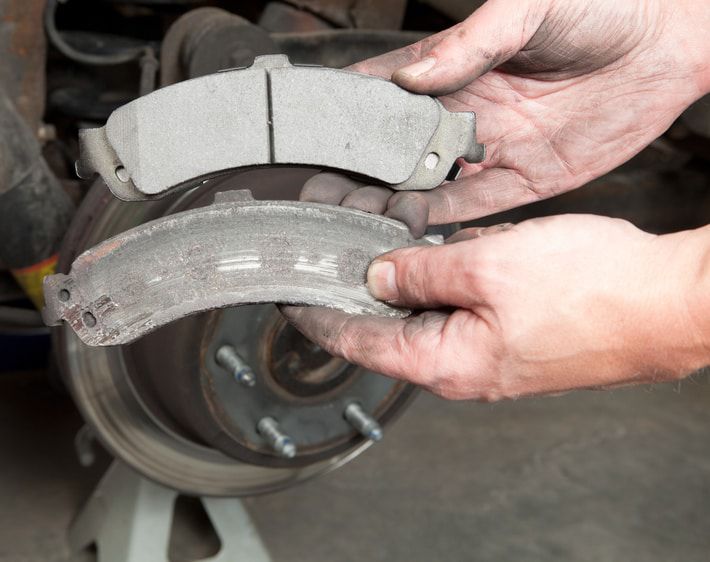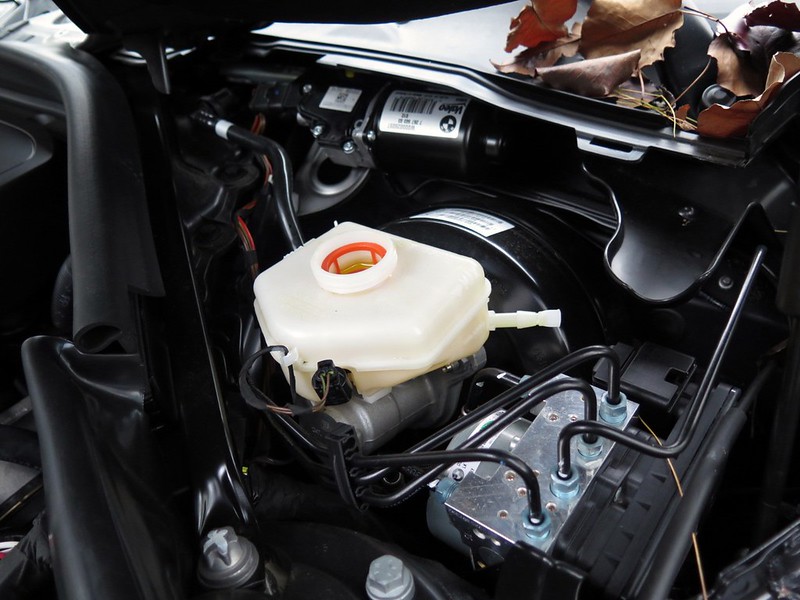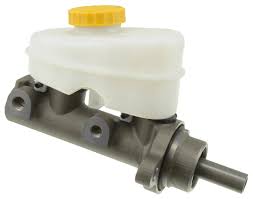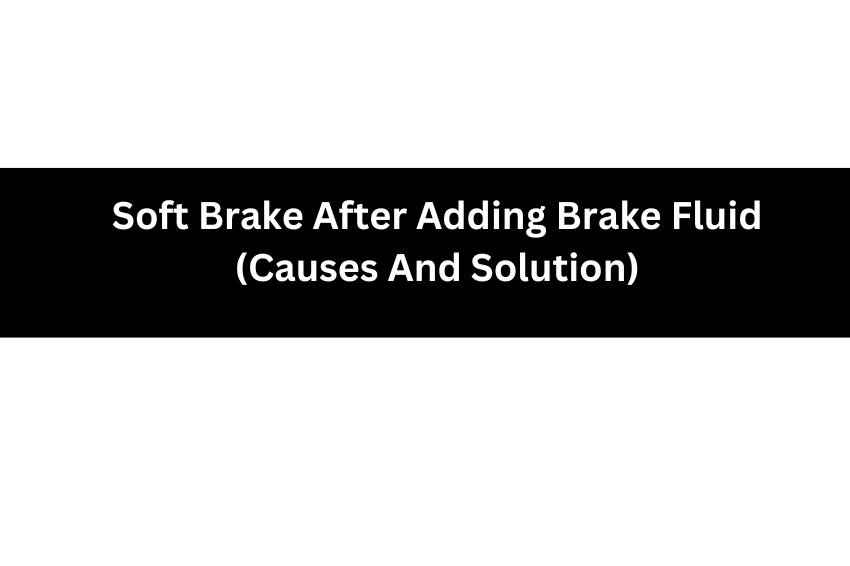Soft brakes, also called spongy brakes, happen when your brake pedal feels squishy or doesn’t respond firmly when you press it.
Instead of feeling solid and tight, the pedal might sink further than normal, making it harder to stop your car.
This problem often points to an issue in your car’s braking system, which relies on hydraulic pressure to work properly.
Common Causes Of Soft Brakes After Adding Brake Fluid
Here are the most common reasons your brakes remain soft, and what to do next
Air In The Brake Lines
Air in the brake lines is one of the most common causes of a soft brake pedal.
Your braking system uses hydraulic pressure to make the brakes work, but if air gets into the system, it disrupts this pressure.
This makes the pedal feel soft or spongy because the air compresses under pressure, unlike brake fluid.
Air can enter the system during brake fluid changes, repairs, or if the brake lines leak.
To fix this, you need to bleed the brakes, which removes the air and restores proper hydraulic pressure.
If you’re familiar with the process, you can do this yourself, but it’s often better to have a mechanic handle it to ensure it’s done correctly.
Contaminated Or Old Brake Fluid
Brake fluid plays a big part in transferring pressure to the brakes.
If the fluid is old, contaminated, or has absorbed too much moisture, it can reduce its effectiveness.
This can make your brakes feel soft even after you’ve topped up the fluid.
Brake fluid absorbs moisture over time, which lowers its boiling point and creates air pockets when the system heats up.
If the fluid looks dark or murky, it’s a sign it needs to be replaced.
A full brake fluid flush is usually the best solution.
However, regularly checking and replacing brake fluid can prevent this problem from happening again.
Worn Brake Pads Or Rotors
Worn brake pads or damaged rotors can also make your brake pedal feel soft.

When pads wear down, they require more brake fluid to push them against the rotors.
This extra movement in the system can give the pedal a soft or delayed feel.
If you hear squealing or grinding noises when braking, it’s likely your brake pads are worn.
Replacing the pads and inspecting the rotors for damage should resolve the issue.
It’s also a good idea to have a mechanic check the entire braking system to make sure everything is in good condition.
Brake Line Leaks
A leak in the brake lines or the brake fluid reservoir is a serious issue that can cause soft brakes.
If fluid is leaking, it reduces the hydraulic pressure needed for the brakes to work properly.
Signs of a leak include a drop in brake fluid levels or visible fluid near the brake lines or under the car.
Driving with a leak is dangerous because it can lead to brake failure.
If you suspect a leak, stop driving immediately and have the issue inspected and repaired by a professional.
Faulty Master Cylinder
The brake master cylinder is a key part of the hydraulic braking system.
If it’s worn out or failing, it may not create enough pressure to make the brakes work effectively, leaving you with a soft pedal.
A failing master cylinder can also cause brake fluid leaks, which worsen the problem.
If you’ve ruled out other causes and still have soft brakes, this could be the issue.
Replacing the master cylinder is often necessary in this case.
How To Diagnose The Issue With Soft Brakes?
Soft brakes can be caused by different problems in the brake system, and you need to identify the exact cause.
Here’s a simple guide to help you diagnose the issue with your soft brakes, step-by-step.
Step 1: Check The Brake Fluid Level And Quality
The first thing you should do is check the brake fluid level.
If the fluid is too low, it can cause the brakes to feel soft or spongy.
Open the brake fluid reservoir under the hood and make sure the fluid reaches the recommended level.

Also, take a look at the brake fluid’s color and clarity.
Healthy brake fluid is clear or light amber.
If it’s dark or murky, it’s contaminated and may need to be flushed out.
Contaminated brake fluid can make the pedal feel soft, even if you’ve added more fluid.
Step 2: Look For Visible Leaks
Check the brake lines and the area under your car for any visible leaks.

Brake fluid leaks reduce hydraulic pressure, which can cause your brake pedal to feel soft.
Look around the brake fluid reservoir, the brake lines, and the wheels for any signs of leaking fluid.
If you notice fluid leaking, it’s important to fix the issue immediately, as it can lead to brake failure.
Step 3: Test The Brake Pedal Response
Press down on your brake pedal with the engine off and see how it responds.
If the pedal goes down slowly or feels spongy, air may have entered the brake lines.
A soft pedal could also mean that the brake booster is not working properly.
If the pedal feels normal when you first press it and then drops further after holding, the problem could be in the master cylinder.
Step 4: Inspect The Brake Pads And Rotors
Worn-out brake pads or damaged rotors can also cause your brakes to feel soft.
When the pads wear thin, they require more brake fluid to make contact with the rotors.
This additional fluid movement can lead to a soft pedal feel.
To check your brake pads, look through the wheel spokes.
If the pads look thin or worn, they should be replaced. Inspect the rotors for any grooves or damage that may need attention.
Step 5: Check For Air In The Brake Lines
Air in the brake lines is another common cause of soft brakes.
When air enters the hydraulic system, it reduces the brake fluid’s ability to generate pressure.
You’ll need to “bleed” the brakes to remove the air.
If you’re unsure how to do this, you may want to seek help from a mechanic.
Step 6: Assess The Master Cylinder
If you’ve gone through the previous steps and your brakes are still soft, the master cylinder may be the problem.
The master cylinder is a key part of the braking system that controls the pressure of the brake fluid.

A damaged or worn master cylinder can lead to soft brakes.
If you notice any signs of brake fluid leaking around the master cylinder, it’s a good idea to get it inspected and possibly replaced.
With that, said, If you’ve followed these steps and your brakes are still soft, or if you’re unsure about any part of the diagnosis, take your car to a professional mechanic.
Soft brakes can be dangerous, and getting the right repairs done quickly is important for your safety.
